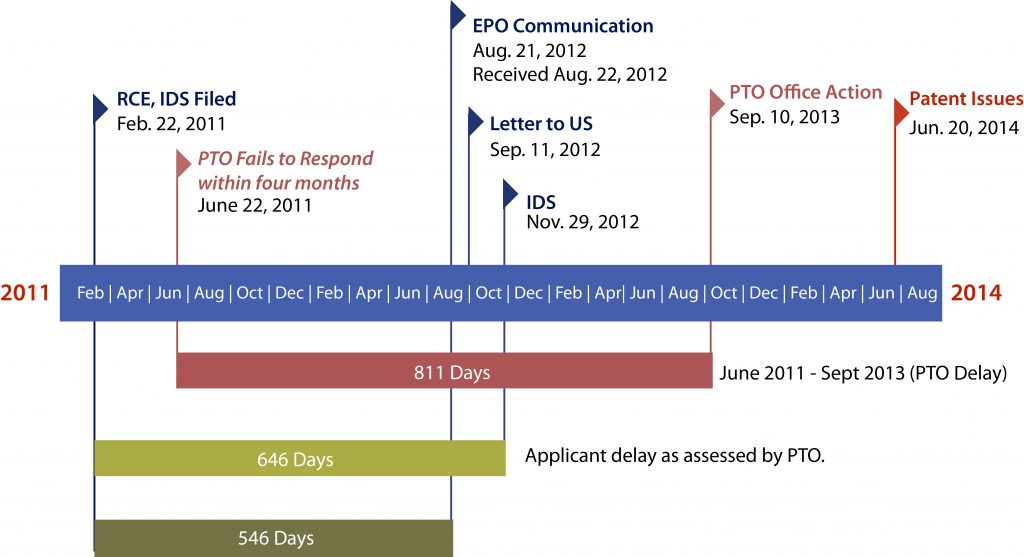Federal Circuit Holds that USPTO May Not Reduce PTA for Periods of Time in which There Was No Action Applicant Could Take to Conclude Prosecution
- January 24, 2019
- Posted by: Sharla Flohr, Ph.D.
- Category: Blog
Supernus Pharmaceuticals, Inc. v. Iancu (Fed. Cir. 2019)
This ruling could substantially increase PTA in situations where Applicant delay was subtracted due to filing a “Supplemental Paper” under 37 CFR 1.704(c)(8). Patentees are urged to review recently issued patents and continue monitoring PTA calculations for errors in Applicant delay calculations until the USPTO issues new rules to implement the holding in this case.
In a decision issued yesterday, the Federal Circuit reversed the District Court’s grant of summary judgment against Supernus Pharmaceuticals, Inc. (“Supernus”) and remanded the case for further consideration.
As background, the patent at issue (US 8,747,897) was granted to Supernus with an award of 1260 days of patent term adjustment (“PTA”). Supernus filed a request for reconsideration of PTA with the USPTO arguing that the deduction of a 646-day period for filing an IDS on November 29, 2012 after the filing of an RCE on February 22, 2011 was improper. The USPTO rejected the request for reconsideration based upon the Federal Circuit’s decision in Gilead Sciences, Inc. v. Lee holding that submission of an IDS after the filing of a response to an election or restriction requirement is subject to a reduction under 37 CFR 1.704(c)(8) because any relevant information submitted to the USPTO after an initial reply interferes with the USPTO’s ability to process an application.
Supernus appealed to the U.S. District Court for the Eastern District of Virginia, which granted summary judgment in favor of the USPTO. Supernus then appealed to the Federal Circuit, arguing, in part, that any reduction in PTA may not exceed the “time during which the applicant failed to engage in reasonable efforts to conclude prosecution of the application.” 35 USC 154(b)(2)(C)(i). Specifically, Supernus argued that, out of the 646-day period between the filing of the RCE and the IDS, it was entitled to at least 546 days because the European Opposition could not have been cited earlier than the date it was communicated by the European Patent Office. Supernus conceded the 100 days from the date the opposition was communicated to the date the IDS was filed citing the opposition. The Federal Circuit adapted an illustration provided by Supernus in the decision, reproduced below:

The Federal Circuit agreed with Supernus and found this question was not presented in Gilead and thus, Gilead does not control. In Gilead, Applicants were aware of the documents cited in the IDS at the time the restriction response was filed. However, Supernus could not have filed an IDS to cite the EP opposition at the time the RCE was filed because the EP opposition did not yet exist. Therefore, the Federal Circuit found that deduction of PTA for the 546 days in which the Supernus could not have filed an IDS to cite the EP opposition was counter to the PTA statute:
On the basis of the plain language of the statute, we hold that the USPTO may not count as applicant delay a period of time during which there was no action that the applicant could take to conclude prosecution of the patent. Doing so would exceed the time during which the applicant failed to engage in reasonable efforts.
Although this ruling clearly implicates periods of applicant delay based on filing an IDS after the filing of a response (i.e., supplemental papers under 37 CFR 1.704(c)(8)), it could have broader implications for any period in which there was no action that the applicant could take to conclude prosecution.
On the other hand, the ruling does not eliminate reduction of PTA for all “supplemental papers” filed after the filing of a response, only those in which there was no “failure to engage in reasonable efforts to conclude prosecution.”
It remains to be seen how the USPTO will implement this ruling in its automated calculation of PTA. In the meantime, patentees are strongly encouraged to review all PTA calculations of applicant delay and file requests for reconsideration with the USPTO as warranted.
